- "Great Snakes!"
- —Tintin
- "Eureka!"
- —Tintin
Tintin is a reporter, adventurer, traveler, and the protagonist of the popular comic book series The Adventures of Tintin, which was written by the Belgian cartoonist Georges Remi, better known as Hergé (1907–1983).
Biography
Tintin made his first appearance in Tintin in the Land of the Soviets (1929–1930) as a journalist reporting on the Bolsheviks of Soviet Russia with his loyal dog Snowy and soon evolved into an investigative reporter and crime-buster whose curiosity draws him into the dangerous circles of drug-traffickers and mercenaries. Tintin seems to be physically quite strong as he sometimes defeats criminals without much difficulty with punches and once easily broke a door in The Secret of the Unicorn.
Hergé never explicitly confirmed Tintin's nationality, but vaguely refers to him as Belgian and living in Brussels (the streets of Brussels are unmistakable in the backdrop of The Secret of the Unicorn and The Red Sea Sharks. Furthermore, in Tintin in Tibet, the address written on Chang‘s letter was "比國布魯塞爾", which means "Brussels, Belgium").
Hergé also never confirmed Tintin's age, but the comic books portray him as a young adult, cultured, worldly, and utterly responsible.
However, in Hergé's Adventures of Tintin, Tintin's home is located in New York and is supposedly American.
In earlier adventures, Tintin and Snowy live alone in an apartment, but they eventually go on to stay in one of Captain Haddock's spare rooms at Marlinspike Hall, giving the impression that Tintin is old enough not to need the influence and presence of parents or school.
In The Secret of the Unicorn, Tintin's passport states his birth year as 1929, which was the year of his first appearance in The Land of the Soviets, estimating his age to be 15, while the official Tintin website states his age as between 16–18. Hergé uses a floating timeline in The Adventures of Tintin so that while the world ages around him, Tintin does not age.
Tintin is well-educated, intelligent, and selfless with morals that cannot be compromised. He is efficient and responsible, does not smoke and rarely drinks, and is athletic (he is seen doing yoga various times throughout the series, and does stretches and warm-ups in Prisoners of the Sun). He is a skilled driver of almost any vehicle, including tanks, motorcycles, cars, helicopters, and speedboats.
The final unfinished adventure, Tintin and Alph-Art, saw Tintin being led out of his cell to be killed, although it is very unlikely that he dies at the end of the story.
Names
These are the international names for Tintin
- Afrikaans: Kuifie
- Arabic: تان تان (Tan Tan)
- Chinese: 丁丁 (Dīngdīng)
- Dutch: Kuifje
- Finnish: Tintti
- German: Tim
- Greek: Τεντέν
- Icelandic: Tinni
- Japanese: タンタン (Tan Tan)
- Latin: Titinus
- Portuguese: Tintim
- Korean: 탕탕 (Tangtang)
- Russian: Тинтин (Tintin)
Character
- "The idea for the character of Tintin and the sort of adventures that would befall him came to me, I believe, in five minutes, the moment I first made a sketch of the figure of this hero: that is to say, he had not haunted my youth nor even my dreams. Although it's possible that as a child I imagined myself in the role of a sort of Tintin."
- — Hergé
Tintin is shown as a well-rounded yet open-ended character, noting that his rather neutral personality, odd given the evil, folly and foolhardiness which he encounters. His boy-scout-style ideals, which represent Hergé's own, have never been compromised by the character either. Tintin has a tendency to tie and gag people, is often shown enjoying doing this. Unlike other characters such as Captain Haddock or Professor Calculus, Tintin has no discernible backstory. Unlike Haddock and Calculus, Tintin's roots prior to Tintin in the Land of the Soviets are never discussed. His companions encounter old friends such as Captain Chester or Hercules Tarragon, yet Tintin only meets friends or enemies whom he met in previous adventures. At the end of Tintin and Alph-Art he is to be turned into a Cesar. Although is seems very unlikely that he dies, his fate is still left unknown.
Physical Appearance
Tintin had fair complexion, ginger hair styled in quiff, black dot eyes and wears blue sweater, white shirt, brown plus fours, white socks and bright van dyke brown shoes.
In the 1972 animated film, he wears blue sweater, white shirt, brown trousers which replaces his plus fours and brown shoes.
In the 2011 animated film, he had fair skin, slightly rosy cheeks, ginger hair styled in quiff, matching eyebrows, turquoise green eyes and wears blue sweater, white shirt, brown plus fours, black socks and dark brown shoes. In the ending of the film, he wears brown tweed jacket, white shirt, black necktie, sunflower yellow v neck sweater vest, brown plus fours, black socks and dark brown shoes.
Titles in the Tintin Comic Series
- Tintin in the Land of the Soviets (1929–1930)
- Tintin in the Congo (1930–1931)
- Tintin in America (1931–1932)
- Cigars of the Pharaoh (1932–1934)
- The Blue Lotus (1934–1935)
- The Broken Ear (1935–1937)
- The Black Island (1937–1938)
- King Ottokar's Sceptre (1938–1939)
- The Crab with the Golden Claws (1940–1941)
- The Shooting Star (1941–1942)
- The Secret of the Unicorn (1942–1943)
- Red Rackham's Treasure (1943–1944)
- The Seven Crystal Balls (1943–1948)
- Prisoners of the Sun (1946–1949)
- Land of Black Gold (1939-40, 1948–1950)
- Destination Moon (1950–1953)
- Explorers on the Moon (1950–1954)
- The Calculus Affair (1954–1956)
- The Red Sea Sharks (1958)
- Tintin in Tibet (1960)
- The Castafiore Emerald (1963)
- Flight 714 (1968)
- Tintin and the Picaros (1976)
- Tintin and Alph-Art (1986, 2004)
Films
- The Crab with the Golden Claws - Animated
- Tintin and the Golden Fleece - Live Action
- Tintin and the Blue Oranges - Live Action
- Tintin and the Temple of the Sun - Animated
- Tintin and the Lake of Sharks - Animated
- The Adventures of Tintin: The Secret of the Unicorn - Animated
- The Adventures of Tintin II (Unreleased sequel)) - Animated (expected)
Television
- Hergé's Adventures of Tintin (1963–1971) - Animated
- The Adventures of Tintin (TV series) (1991–1992) - Animate
Gallery
Trivia
Tintin is shown to have a little trickster side to his normally gentlemanly manner. In The Crab with the Golden Claws, he meets Thomson and Thompson (Dupond et Dupont) at a restaurant where they order beer. Thompson and Thomson each slap Tintin on the back in a greeting. As they take a sip of their drinks, Tintin slaps both of them on the back while saying, "And nice to see you too, my dear old friends!"
- Tintin is very intelligent. he could build propellers, [land of the soviets] and also cars!
-
- Tintin also shows a side of deviousness when it comes to some things: In Tintin in America he calls out "Hey, fellas! Do you know how to call the police without a telephone? Well!" He then fires several shots off from the gun he is holding while laughing like a maniac.
- Tintin and Cole Phelps (from L.A Noire) have a lot in common.For example they had similiar hair styles, they were both young and strong, they were both solving crimes in 20th century and they were both working with/for the police.
pcd:Tintin
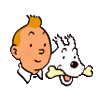
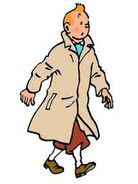
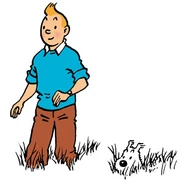
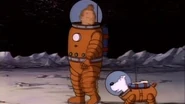
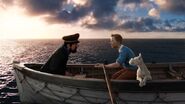
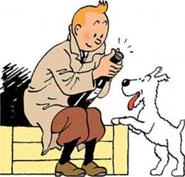
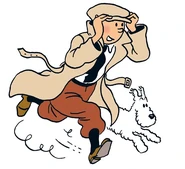
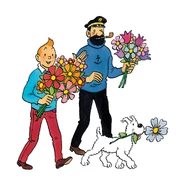


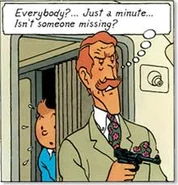


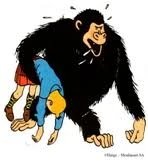
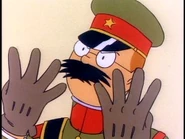
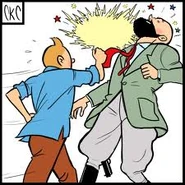
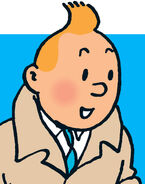
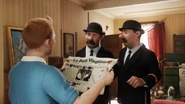
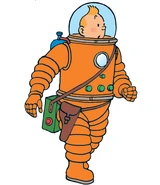

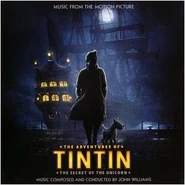
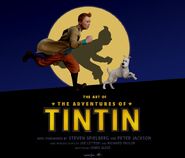
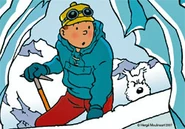

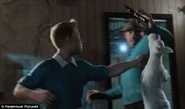
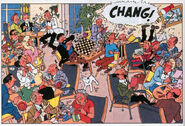
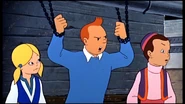
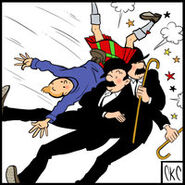
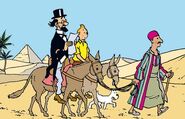

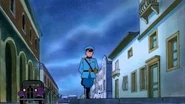
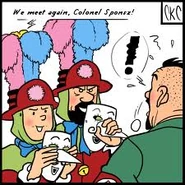
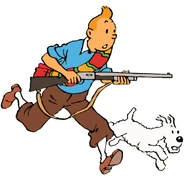
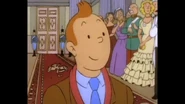

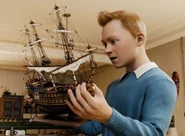


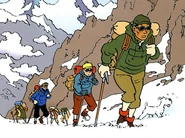

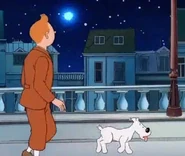

![Snowy & Tintin.png (312 KB) Tintin's White T-Shirt]]](https://static.wikia.nocookie.net/tintin/images/e/e7/Snowy_%26_Tintin.png/revision/latest/scale-to-width-down/165?cb=20181008201341)
![Tintin White T-Shirt.png (457 KB) Tintin Is Reading a Book.]]](https://static.wikia.nocookie.net/tintin/images/a/aa/Tintin_White_T-Shirt.png/revision/latest/scale-to-width-down/185?cb=20181008201946)